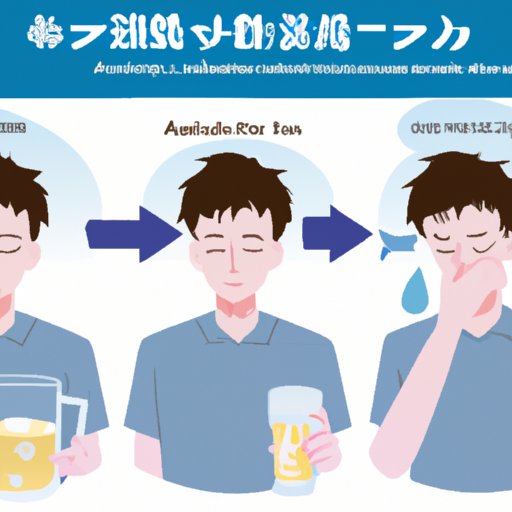
Introduction
A hangover is a collection of symptoms that can occur after drinking too much alcohol. Symptoms may include headache, fatigue, nausea, and sensitivity to light and sound. These symptoms can be uncomfortable and make it difficult to function the next day.
Avoiding a hangover is important if you want to feel your best and avoid missing out on important events. Fortunately, there are several things you can do to prevent hangover symptoms.
Pre-hydration
Inadequate hydration is a major cause of hangovers. Alcohol is a diuretic, meaning it causes your body to lose water. To prevent dehydration, it’s important to drink water before consuming alcohol.
Start pre-hydrating several hours before you plan to drink alcohol. Drinking water throughout the day can help ensure your body is adequately hydrated before you start drinking. Aim to drink at least one glass of water for every alcoholic drink you consume.
Stick to Lighter Drinks
The alcohol content of different drinks can vary widely, with some drinks containing much more alcohol than others. Drinking lighter drinks can help prevent hangover symptoms.
Beer, for example, typically contains a lower alcohol content than wine or spirits. Light beers have even less alcohol than regular beer. If you prefer wine, stick to white wine instead of red, as it typically contains less alcohol. If you prefer spirits, choose drinks that are mixed with water or juice instead of soda, as soda can dehydrate you further.
Eat Before Drinking
Eating before drinking can help slow down the absorption of alcohol into your system, preventing you from getting too drunk too quickly.
Eat a meal that’s high in protein and carbohydrates before you start drinking. Avoid fatty foods, as they can slow digestion and make it harder for your body to process alcohol.
Alternate Between Alcohol and Non-Alcoholic Drinks
Drinking non-alcoholic drinks in between alcoholic ones can help dilute the alcohol in your system, making it easier for your body to process and reducing your chances of experiencing hangover symptoms.
Suggestions for non-alcoholic drinks include water, soda, juice, or mocktails. You can also try diluting your alcoholic drinks with water or ice to reduce the alcohol content.
Time Your Drinks
Spacing out your drinks can help prevent you from getting too drunk too quickly and reduce your chances of experiencing hangover symptoms.
Try alternating alcoholic and non-alcoholic drinks or limiting yourself to one drink per hour. Set a goal for how many drinks you’ll have in a night and stick to it.
Get Enough Sleep
Sleep is important for your body to recover from the effects of alcohol. Getting enough sleep can help reduce the severity of hangover symptoms.
Aim to get at least eight hours of sleep after drinking. Avoid staying up too late or waking up too early, as both can make it harder for your body to recover.
Conclusion
To avoid a hangover, it’s important to take steps to prevent dehydration, limit your alcohol intake, eat before drinking, drink non-alcoholic drinks, space out your drinks, and get enough sleep. By following these tips and tricks, you can enjoy a night out without regretting it the next day.
Remember, taking steps to prevent hangovers is important for your health and wellbeing. Don’t let a hangover ruin your day – take these steps to prevent it.





